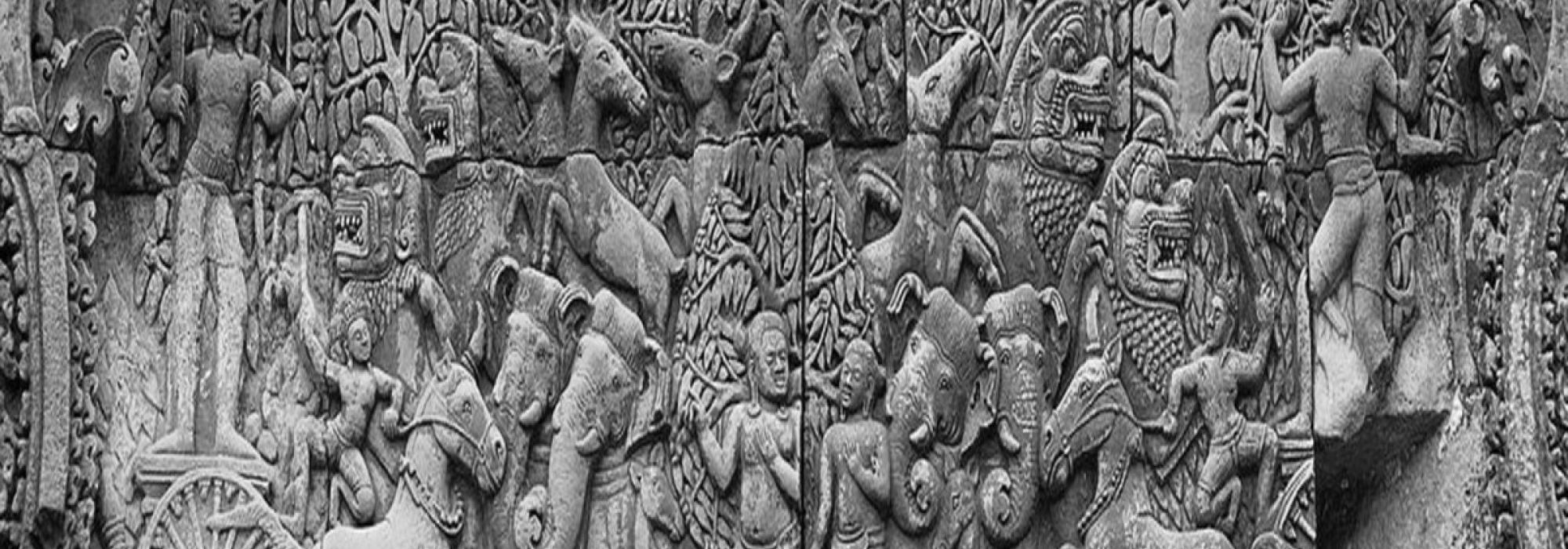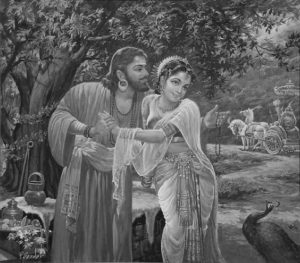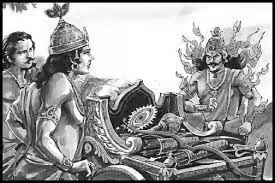In the north, Arjuna went to Gaṅgādvāra, the Agastyavaṭa in the Himalayan region, Vasiṣṭha mountain, Hiraṇyabindu, and other pilgrimage centres; in the east, he went to the Naimisāraṇya, River Kauśikī, Gayā, Gaṅgā, Mahendra mountain, Maṇalūra, and other places; in the south, he went to the Pañca-tīrtha[1] and other places; in the west, he visited several famous pilgrimage centres and finally came to Prabhāsapura. In all those sacred places, he had ritual baths, offered tarpaṇas, gave away gifts, and undertook acts of charity and universal welfare. When he was at Gaṅgādvāra, he married Ulūpī, a nāgā maiden and in due course she gave birth to Irāvata; at Maṇalūra, Arjuna married the princess Citrāṅgadā, who later gave birth to the hero Babhruvāhana.
When Kṛṣṇa learnt that Arjuna was visiting Prabhāsapura, he went to meet him and enquired after his welfare. Kṛṣṇa then took Arjuna to the Raivataka mountain. As per Kṛṣṇa’s orders, it had already been decorated. They took their snacks and meals on the mountain; then they watched dramas and dance recitals. At night, having comfortably lain down on beautiful beds, Arjuna described to Kṛṣṇa all the details of his travels to rivers, mountains, and tīrthakṣetras before falling asleep. In the morning, he woke up to melodious music, the sounds of the vīnā, and divine stotras. After performing his daily ablutions, he went along with Kṛṣṇa to Dvāraka, riding a golden chariot. The entire city had been decorated to welcome Arjuna; thousands of townspeople had gathered on the royal road in order to catch a glimpse of him; the chiefs of the Bhoja, Vṛṣṇi, and Andhaka clans came to greet him. Arjuna bowed down to all the elders and took their blessings; he embraced his equals; he blessed all those younger to him; he stayed in the comforts of Kṛṣṇa’s house. A few days later, there was a grand festival held on the Raivataka mountain; it was jointly organized by the Vṛṣṇis and the Andhakas. All over the place one could find maṇṭapas, lamp-trees, musical instruments, music, drama, dance – only this! People from different places came there along with their children, some on a variety of chariots while others came on foot. Several prominent people among the Yādavas were present – Balarāma, Revatī, Akrūra, Sātyaki, and others. Kṛṣṇa and Arjuna went together to participate in this festival; there, Arjuna saw, walking amidst her friends, Subhadrā; he lost his heart to her. Seeing this, Kṛṣṇa said with a smile, “What’s this – a forest-dwelling nomad being tormented by lust? She is my sister; born to the same womb as Balarāma; if you love her, tell me; I shall bring it up before my father.” Arjuna said, “Kṛṣṇa, what are you saying! If your sister becomes my queen, then I will get everything that is auspicious! What should I do to win her hand, tell me; I will do everything that is humanly possible!” Vāsudeva said, “Arjuna! The established practice among kṣatriyas is svayaṃvara; but we can’t be sure that it will work out the way we want; the wise tell us that it is within the framework of dharma for a kṣatriya to abduct a maiden and marry her. Therefore, you kidnap my sister and escape from here! Who knows what might happen in a svayaṃvara?” After that, Krsna and Arjuna sat together and planned the execution of their idea. They sent their plans to Indraprastha through a speedy messenger, who would pass this information on to Dharmarāja. He gave his consent.
Arjuna ascertained the time when Subhadrā would be at the Raivataka mountain; donning his armour and other protective gear, taking his dagger and shield, filling his chariot with a variety of weapons, Arjuna set out as if he was going on a hunt. Subhadrā was returning to Dvāraka after worshipping deities at Raivataka, circumambulation of the mountain, and having received the blessings of brāhmaṇas. Arjuna chased after her, forcibly dragged her into his chariot, and drove in the direction of Indraprastha at the speed of the wind. Upon witnessing this, the soldiers rushed to Dvāraka and reported this to their leader. He sounded the war drums. The Vṛṣṇi heroes, enraged, jumped on to their horses and chariots, ready to chase after Arjuna. There was great chaos; upon seeing that, Balarāma said, “What’s all this commotion? Kṛṣṇa seems to be silent amidst all this! Your excitement seems to be pointless; get his opinion on the matter and then do as he says!” Then they went to meet Kṛṣṇa with Kāmapāla in the lead. Kāmapāla said, “What’s this, Kṛṣṇa? Although you are an eye-witness to these events, you are sitting still without moving your lips! It is for your sake that we honoured Arjuna; it appears that he is wholly unworthy of all that respect; he is treacherous to even those who offer him food and shelter. Having ignored all of us, look how he has abducted Subhadrā! What he has done is as good as chasing after his own death; I feel like going after him this very moment and destroying all those Kauravas!” The rest of the warriors began saying similar things when Kṛṣṇa said, “Arjuna has not done something that is dishonourable to our clan; in fact, what he has done has brought us honour; the reason being: he did not see us as avaricious folk who are always behind money; what’s the great valour in a svayaṃvara? Kanyādāna is like a transaction of money or cattle, which go from one hand to another; what’s so noble about it? After being born as a human being, nobody will sell his daughter; therefore, Arjuna abducted Subhadrā; that is also dharma; further, this alliance is a great one; Arjuna is a warrior born in the Bharata lineage; he is the son of Kuntī; even Indra and Rudra cannot match him in valour. And when such a great warrior, speedy in the usage of weapons, has ascended my divine chariot yoked by the best horses – I don’t see anyone equalling him let alone defeating him! Therefore, go after Arjuna in a peaceful manner and bring him back here; in case you begin chasing after him and he goes away to his kingdom after defeating all of you, that would be a great dishonour to you all; if you go in peace, it will not appear as if you have been defeated.” They followed his advice; Arjuna returned, married Subhadrā formally and spent the remaining days of his exile there; upon the completion of twelve years, Arjuna took Subhadrā and proceeded to Khāṇḍavaprastha. She was dressed in the clothes of a milk-maid; even in that attire, she looked beautiful. As soon as he reached home, Arjuna offered his respects to his mother and elders brothers and went to see Draupadī[2]; Subhadrā also bowed down to everyone and took their blessings. Thus after they had reached their city and settled down, Kṛṣṇa and Balarāma came there along with other Vṛṣṇi heroes bearing several gifts; at Khāṇḍavaprastha, the visitors received excellent hospitality and spent their time in comfort.
In due course, Subhadrā gave birth to a baby boy; he was Abhimanyu, the great hero. Śrīkṛṣṇa was extremely fond of him from the moment he was born; and so were his parents, needless to say; even as a small boy he learnt the use of human and divine weapons from Arjuna and became extremely skilled in their usage; he was as beautiful as the full moon; and his confidence was akin to a lion’s; he was the pride of Arjuna. Similarly, Draupadī too gave birth to five courageous sons through the five Pāṇḍavas. They were called Prativindhya, Sutasoma, Śrutakarma, Śatānīka, and Śrutasena. According to the wishes of Bhīṣma and Dhṛtarāṣṭra, the Pāṇḍavas ruled over Indraprastha in adherence to dharma; the manner in which Dharmarāja lived with his brothers was akin to a mahāyajña that utilized the precepts of the four Vedas. A glimpse of his face brought joy and serenity to the eyes and hearts of the common people.
Time passed thus for a while. Once Arjuna told Kṛṣṇa, “The weather has become bad; the heat has gotten worse! One of these days, let us take all our friends and go to the banks of the Yamunā – that is my desire!” Kṛṣṇa replied, “I too have felt a craving to dance in the waters awhile.” Thus, they took all the people they liked and went to a nice spot on the banks of the Yamunā. A variety of trees had grown there and it was almost like a grove; wherever one cast a glance, one could see entertainment pavilions; there was a lot of food and drink for everyone; they all ate and drank merrily; everyone played together, sang, laughed, made others laugh, gossiped; they played the vīnā, flute, and mṛdaṅga; Draupadī, Subhadrā and other women merrily participated in the revelry while Kṛṣṇa and Arjuna sat on a beautiful seat at some distance, discussing matters of enjoyment and recounting tales of bravery. At that time, a brāhmaṇa came to them; he was a tall man with a golden-hued body; his brilliance was akin to the rising sun. When Kṛṣṇa and Arjuna paid their respects to him, he said, “Sirs, my stomach is huge; I eat a great deal; my stomach is to be filled owing to your compassion!” Arjuna asked, “What food do you eat? If you let us know, we shall try to bring that to you!” He replied, “I don’t eat the food that everyone eats; I am Agni; I want to consume the whole of this Khāṇḍavaprastha; but Indra is protecting this forest; if he sees a spark in the forest, he will shower rains; the reason being that his friend Takṣaka and his family reside here; using that as the pretext, several animals and birds have taken refuge here. You are well-versed in the use of weapons; if you show compassion, I can consume this forest.” Arjuna said, “O Agni! Indeed I have several divine weapons; but I don’t have a bow that is befitting my strength; I shoot arrows extremely fast; therefore any amount of arrows fall short; if I desire to fill up as many weapons as possible, I don’t have a chariot that will accommodate them all; neither do I have horses capable of pulling such a chariot; Kṛṣṇa too is in the same position; he doesn’t have weapons that match his courage; what shall we do? If you can procure the suitable equipment, whatever is possible by human effort, we shall do!” Agni meditated on Varuṇa and invited him there; from Varuṇa, Arjuna received the Gāṇḍīva bow, the inexhaustible quiver of arrows, a resplendent chariot drawn by divine horses that shone like silver and a flagstaff with the emblem of Hanumanta. Varuṇa gave Kṛṣṇa the Sudarśanacakra and the Āgneyāstra. With the Sudarśana, one could kill anyone – devas, humans, rākṣasas, piśācas; after killing the desired person, the discus would fly back to the one who threw it. Apart from this, Varuṇa gave Kṛṣṇa the Kaumodakī mace. Thus equipped with divine weapons and chariots, Kṛṣṇa and Arjuna said, “Now let the devas or asuras come to battle us!” The forest was alight with a huge fire. Kṛṣṇa and Arjuna sat in chariots on either side of the forest fire, ensuring that no animal escaped from the fire. Due to that, thousands of animals and birds cried out in pain and died. Some were half-burnt; the eyes burst out of some; some tried to jump but fell back into the fire and died ultimately; some held on to their children or parents and lost their lives holding tight to their kinsfolk. All the water bodies in the forest began boiling and all the fish and tortoises in those waters were boiled and began floating on the surface. Agni was absolutely delighted! Devendra showered a torrential rain; the lightning and thunder were frightening; but since Arjuna had created a roof of arrows for the entire forest, not a drop of water could pass through and douse the fire. Agni was satiated. But Takṣaka escaped and went away to Kurukṣetra; apart from him, only six creatures survived the wildfire: Takṣaka’s son Aśvasena, the rākṣasa Maya[3], and four Śārṅgaka birds[4]. Devendra sat on his Airāvata, held his Vajra weapon in his hand, and accompanied by the devatās, came on the scene [and battled Kṛṣṇa and Arjuna] but it was of no use.[5] Finally, he showed his admiration for Arjuna and asked him what he wished for. Arjuna asked for a few weapons. Indra gave him a time estimate and said that when Mahādeva is pleased with Arjuna, he would hand him all those weapons.[6]
To be continued…
This is an English translation of Prof. A R Krishna Shastri’s Kannada classic Vacanabhārata by Arjun Bharadwaj and Hari Ravikumar published in a serialized form. Thanks to Śatāvadhāni Dr. R Ganesh for his thorough review and astute feedback. Additional segments from the epic and notes by the translators have been added in the footnotes after going through the Critical Text of the Mahābhārata.
Translators’ Note:
[2]When Arjuna meets Draupadī, she tells him in anger, “O Kaunteya, go and spend your time with that girl from the Sātvata lineage. Go! Even if the first tie is strong, when a load is applied, it loosens.” Then she cried and complained. Dhanañjaya pacified her and then sent for Subhadrā. As soon as Subhadrā saw Draupadī, she offered her respects to her and said, “I am your servant.” Kṛṣṇā embraced Subhadrā and said, “Let your husband have no enemies!”
[3] Translators’ Note: When Maya tried to escape, Kṛṣṇa chased after him and lifted his discus ready to kill the rākṣasa but at the appropriate time, he took refuge under Arjuna, who promised him protection.
[4] Translators’ Note: The Śārṅgaka birds were saved because they were actually children of the ṛṣi Mandapāla, who had requested Agni to spare his children.
[5] Translators’ Note: After Indra and others were checked by Kṛṣṇa and Arjuna in battled, an incorporeal voice said, “Indra, your friend Takṣaka wasn’t in the forest during the fire. You cannot defeat Arjuna and Kṛṣṇa in battle; they are incarnations of Nara and Nārāyaṇa.”
[6] Translators’ Note: When Indra offered a boon to Vāsudeva, he prayed that he might always be loving towards Pārtha.



















































